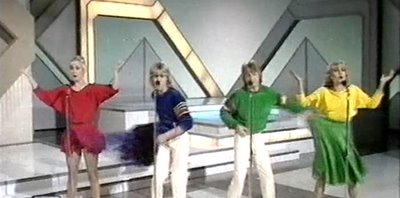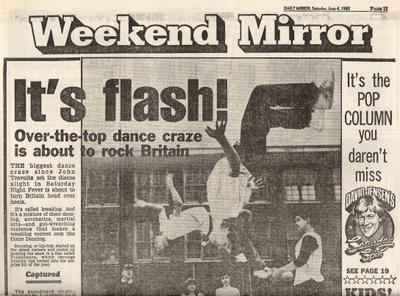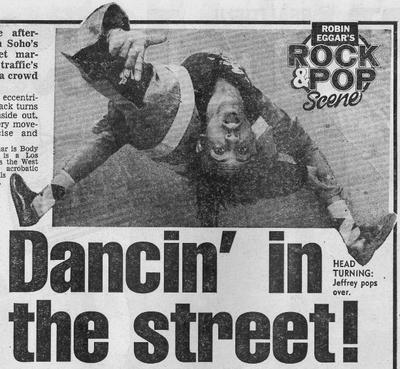 B.C. - Terror of Anglia Television's Birthday Club in the 1980s...
B.C. - Terror of Anglia Television's Birthday Club in the 1980s...B.C. will be well known to younger viewers of ITV regional station Anglia in the 1980s. The puppet was introduced early in the decade to "help" the on-screen continuity person read out young viewers' birthday cards in the popular daily "Birthday Club" sessions, and inspired by the long-running ITV regional puppet character Gus Honeybun - a rabbit.
Helen McDermott worked with Gus at Westward.
As the 1980s began, Helen was just months into a new role as a continuity announcer with Anglia Television. She put forward the idea to the Powers That Be of the time that an Anglia version of Mr Honeybun would be ideal for that channel's birthday club slots. Anglia was initially unimpressed with the idea, but Helen persevered. It would be good, she said, to have something in the Birthday Club feature that would amuse children who were not waiting for a birthday mention. Eventually, Anglia agreed. Interviewed years later, Helen recalled that the original puppet was then made by somebody called "Vera, from down the road." B.C. made his debut in late 1980.
 B.C. - allowed to stay up to welcome in the New Year of 1985.
B.C. - allowed to stay up to welcome in the New Year of 1985.B.C. looked rather like a leopard, although many thought his ears were more bear-like! Before his launch, there was a competition to name the character. The winning entrant came up with "B.C." (for "Big Cat" and also "Birthday Club") and the little git proceeded to wreak absolute havoc in the years that followed.
 All the daytime presenters, including Katie Glass, Patrick Anthony, Caroline Oldrey and Michael Speake, did battle with B.C. in the '80s. In 1986, Michael Speake wrote a book about the character, B.C. And The Magic Book.
All the daytime presenters, including Katie Glass, Patrick Anthony, Caroline Oldrey and Michael Speake, did battle with B.C. in the '80s. In 1986, Michael Speake wrote a book about the character, B.C. And The Magic Book.The Anglia TV presenters were very much part of our lives, almost like family. "Ooh, Michael's still got that cold," we'd say, or, "What's Patrick cooking tonight?" B.C. was a personality in his own right (as far as I was concerned), a somewhat anarchic addition to the team. But what made him tick? What (or who) was his motivating force?
David Clayton was a presenter at Anglia throughout 1982, and recalls:
"The continuity studio was by necessity small and had the usual collection of discarded announcer presents and letters, the odd pile of face powder compacts, hairbrushes and B.C., the birthday club puppet. My debut as an announcer was with my hand up B.C. operating it for the on-duty day announcer. If you did an evening shift you came in to relieve the day announcer so he or she could get some lunch and a break. You also became the unofficial puppeteer around tea-time for the children's birthday club.
"I think I was B.C. first to Katie Glass and had to crouch down at her side out of shot and try and make B.C. animated and cheeky. Michael Speake used to be quite ruthless with the puppet but Katie was the most frightening to work with. One of B.C.'s features was that one of your hands held a stick coming out of the base of him, the other hand was inside one of his paws. If you were announcing with Katie doing the puppet she had the habit of making B.C. grab your tie just at the last second and yanking downwards with some degree of violence.
"This then made your tie knot extremely small and tight to the point it was virtually impossible to undo it. So for the entire programme you had just linked to, you were struggling to actually undo and re-tie your tie. Short of cutting it off with scissors it was touch and go whether you could make yourself presentable for the next link. Sadly there wasn't an equivalent female garment with which to exact your revenge when roles were reversed."
David also recalls the deelyboppers craze of 1982, and taking a pair in for B.C. to wear on-screen. B.C. was very active that day, lots of head waggling, and one of the boppers fell off. David almost said: "Oh, B.C., you've lost one of your balls!" but managed to substitute the word "baubles" at the last minute! True professionalism!
If anybody has any Birthday Club footage, I would love to see it. It's time to start a B.C. archive! You can E-mail me at: actual80s@btinternet.com
I must confess, I was about sixteen when B.C. made his debut and his target audience was tiny tots and primary school children. But I thought he was great.
Why?
"You were, and are, naturally childish," says my loving wife.
Not at all. B.C. was... er... well... he was... um... cult... yes, that's it, he was cult!!
That makes him respectable.
 The celebrity at home in 1986. The former co-presenter of Birthday Club celebrates his own birthday on April 1st. In 1986, B.C. was living in this desirable residence at the bottom of Uncle Michael's garden. Where is he now?
The celebrity at home in 1986. The former co-presenter of Birthday Club celebrates his own birthday on April 1st. In 1986, B.C. was living in this desirable residence at the bottom of Uncle Michael's garden. Where is he now?Courtesy of YouTube - inspired 1980s lunacy with BC and his companions.
























